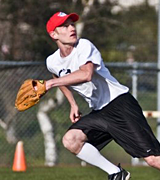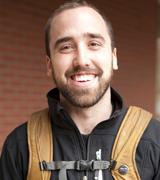French Knights and Baseball Bats
Student Research Permeates the Greater Academic Community
 ----------
----------
By Beth Douglass ’10, Contributing Writer
Ben Walker, a 2009 Seattle Pacific graduate, can tell you all sorts of facts about baseball. But as much as he enjoys this history and trivia, an electrical engineering major like Walker also wonders about other aspects of the game — such as the physics and design behind baseball bats.
While researching the topic as an SPU student, Walker came to an interesting conclusion: Throughout history, the emergence of a new hitting star — like Babe Ruth in the 1920s or Ted Williams in the 1940s — would lead to changes in both the shape and design of baseball bats. It was a thesis that combined the usually separate fields of science and history, and Professor of History Bill Woodward immediately pegged it as something unique.
But the project was not just different; it was something that Woodward thought could be of great interest to those in the greater academic community, too. “I envisioned steering it toward publication from early on,” he says.
Learning Comes in Many Shapes and Forms

Ben Walker
Student research at Seattle Pacific encases a wide variety of topics across multiple disciplines. Under the guidance and supervision of their professors, students delve into the complex worlds of physics, microbiology, and more.
“It’s unusual for a school our size to have so many faculty members mentoring undergraduate students through the students' scholarship,” says Margaret Diddams, director of SPU’s Center for Scholarship and Faculty Development. “And not just in the sciences. Research really is about scholarship in all disciplines. Humanities, theology, interior design, textiles.”
More than that, SPU research is being noticed and recognized far beyond just the walls of the university. By utilizing his professor’s support, Walker was able to format and edit his research for scholarly publication. In summer 2010, his article "Properties of Baseball Bats" ran in a peer-reviewed academic publication called The Baseball Research Journal.
“Student scholarship at SPU rises out of two things: We embrace active learning. And we want to know that our students are learning — which means outcome-oriented work,” Diddams says. “We have multiple opportunities for students to demonstrate what they have learned.”
Knowledge Is for Sharing

Brent Miles
Another such opportunity can be seen in the work of SPU senior Brent Miles, whose research on a crusade in the Middle Ages has been shared with students and scholars all across the country.
He shared his passion for medieval history by presenting at undergraduate sections of two different research conferences: a faith and history conference at Oregon's George Fox University in October 2010 and an English conference at Illinois' St. Francis University in March 2011. This month, he also presented at the International Medieval Congress in Kalamazoo, Michigan.
Miles’ project is based on a paper he wrote last year while studying abroad at Oxford University in the United Kingdom. It centers on the Albigensian crusade, a crusade from the early 1200s that took place in southern France and targeted Christian heretics and their supporters. The project examines one of the under-utilized narrative accounts of the crusade, in order to reclaim its value as a source.
Research Experience Provides Guidance Towards Future Careers
Walker's research benefited from the guidance of faculty members like Woodward and Professor of Engineering Elaine Scott. Miles, too, can name multiple professors who have pushed and encouraged him throughout the research process. Professor of History Alberto Ferreiro directed Miles towards a number of resources — and he even got help over the summer from Assistant Professor of Classics Owen Ewald in translating a couple of Papal letters from Latin.
"It's just really cool to have professors that care about you and to help you succeed," Miles said. His goal is to one day become a history professor, hopefully specializing in medieval history, so being able to research, write, and present a scholarly article only helped confirm to him that this really is what he wants to do with his life.
“Our faculty serve our students,” Diddams says. “They help students think through vocational choices. Our mentoring through research and scholarship is also about vocational development. We want students to learn about themselves by serving others.”
Additional reporting by Reece Carson
View Feature Story Archives


